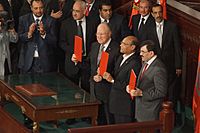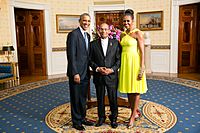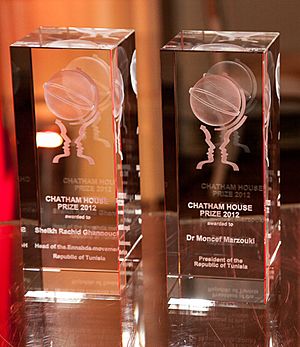Moncef Marzouki facts for kids
Quick facts for kids
Moncef Marzouki
|
|
|---|---|
|
المنصف المرزوقي
|
|
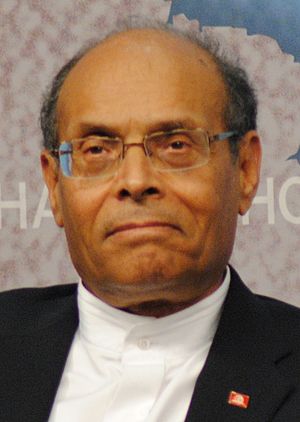
Marzouki in 2013
|
|
| 3rd President of Tunisia | |
| In office 13 December 2011 – 31 December 2014 |
|
| Prime Minister | Beji Caid Essebsi Hamadi Jebali Ali Laarayedh Mehdi Jomaa |
| Preceded by | Fouad Mebazaa (acting) |
| Succeeded by | Beji Caid Essebsi |
| Member of the Constituent Assembly for Nabeul's 2nd district |
|
| In office 22 November 2011 – 13 December 2011 |
|
| Preceded by | Constituency established |
| Succeeded by | Samia Abbou |
| President of the Congress for the Republic | |
| In office 24 July 2001 – 13 December 2011 |
|
| Preceded by | Position established |
| Succeeded by | Abderraouf Ayadi (Acting) |
| President of the Tunisian Human Rights League | |
| In office 12 March 1989 – 5 February 1994 |
|
| Preceded by | Mohamed Charfi |
| Succeeded by | Taoufik Bouderbala |
| Personal details | |
| Born | 7 July 1945 Grombalia, French Tunisia |
| Political party | Al-Irada |
| Other political affiliations |
Congress for the Republic (until 2015) |
| Spouse | Beatrix Rhein |
| Children | 2 |
| Alma mater | University of Strasbourg |
Mohamed Moncef Marzouki (born on July 7, 1945) is a politician from Tunisia. He served as the third president of Tunisia from 2011 to 2014. Throughout his life, he has been a doctor, a human rights activist, and a politician. On December 12, 2011, a group called the Constituent Assembly of Tunisia chose him to be the president of Tunisia.
Contents
Early Life and Education
Moncef Marzouki was born in Grombalia, Tunisia. His father was a judge and supported a political opponent of the country's leader at the time. Because of political issues, his family moved to Morocco in the late 1950s.
Schooling and Early Interests
Marzouki finished his high school education in Tangier, Morocco, in 1961. After that, he went to France to study medicine at the University of Strasbourg. He was very interested in peaceful ways to bring about change. He even traveled to India to learn about Mahatma Gandhi's ideas of non-violent resistance. Later, he also visited South Africa to see how the country moved away from apartheid, a system of racial separation.
Returning to Tunisia and Community Work
In 1979, Marzouki returned to Tunisia. He started the Center for Community Medicine in Sousse. He also created the African Network for Prevention of Child Abuse. He joined the Tunisian League for Human Rights, showing his dedication to helping people.
Political Journey
When the government acted harshly against a group called the Ennahda Movement in 1991, Marzouki spoke out. He asked the Tunisian President, Ben Ali, to follow the law.
Standing Up for Rights
In 1993, Marzouki helped start the National Committee for the Defense of Prisoners of Conscience. This group aimed to protect people who were put in prison for their beliefs. He later left the group when government supporters took control. Marzouki was arrested several times for his activism. He then started another group called the National Committee for Liberties. He also became the President of the Arab Commission for Human Rights.
Founding a Political Party
In 2001, he created a political party called the Congress for the Republic. This party was banned in 2002, but Marzouki moved to France and continued to lead it from there. After President Zine El Abidine Ben Ali left Tunisia during the Tunisian revolution, Marzouki announced he would return to Tunisia and run for president.
Becoming President of Tunisia
On December 12, 2011, the Constituent Assembly of Tunisia elected Marzouki as the temporary president. This assembly was chosen to govern the country and write a new constitution. Marzouki received 155 votes. He was the first president who was not connected to the country's first president, Habib Bourguiba.
Key Actions as President
Just one day after becoming president, on December 14, he chose Hamadi Jebali from the moderate Islamist Ennahda Movement to be the Prime Minister. Jebali then formed his government on December 20.
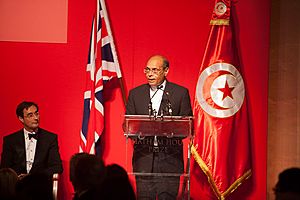
In May 2012, a TV station owner and two others faced legal action. This was because the station showed a film called Persepolis, which included images of God. Marzouki said that the decision was "bad for the image of Tunisia."
As President, Marzouki was important in setting up Tunisia's Truth and Dignity Commission in 2014. This commission was a big step towards helping the country heal and move forward after past problems.
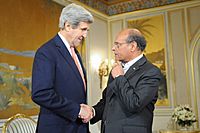
In March 2014, President Marzouki ended the state of emergency that had been in place since the 2011 revolution. This meant that soldiers who were stationed in sensitive areas could return to their bases. The state of emergency had been put in place by the previous president and kept after he was overthrown.
In April 2014, he decided to cut his own salary by two-thirds. He said this was to show that the government needed to be a good example in managing the country's money problems.
Marzouki ran for president again in the November–December 2014 election but was not re-elected. Beji Caid Essebsi became the new president on December 31, 2014.
After the Presidency
On June 25, 2015, Marzouki took part in the Freedom Flotilla III. This was a group of boats trying to reach the Gaza Strip. On June 29, the boats were stopped by the Israeli navy in international waters and taken to a port. Marzouki was sent back to Paris and then returned to Tunis on July 1, where many supporters greeted him.
In 2016, the African Union asked him to help oversee the presidential election in Comoros.
In October 2021, the Tunisian government took away Marzouki's diplomatic passport. In November 2021, an international arrest warrant was issued for him by the Tunisian government. This was for reasons related to state security. On December 23, 2021, Marzouki was sentenced to four years in prison. He was found guilty of "undermining the security of the state from abroad" and causing "diplomatic harm." Marzouki said the ruling was unfair.
In December 2021, Marzouki said he would return to Tunisia and try to change the government. In January 2022, he was among many politicians sent to court for alleged "electoral violations" during the 2019 presidential elections.
In 2022, Marzouki was sentenced to four years in prison while he was not present in court. In 2024, he received another eight-year sentence, also while not present, for comments that authorities said were encouraging people to overthrow the government. In June 2025, Marzouki was sentenced to 22 years in prison, again while not present, on charges related to terrorism.
Personal Life
Moncef Marzouki has two daughters from his first marriage: Myriam and Nadia. Myriam works as a director for a theater company. Nadia has a PhD in political science and researches religious topics.
In December 2011, he married Beatrix Rhein, who is a French doctor. They had a private ceremony. He owns a house near Sousse.
Marzouki often chooses not to wear a tie. Instead, he prefers to wear a burnous, which is a traditional hooded cloak, as a way to honor Tunisian culture.
Awards and Recognitions
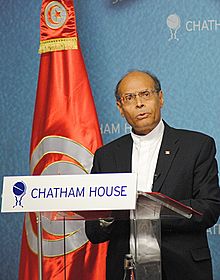
- The Maghrebian Medicine Prize (1982)
- Foundation Scanno Literary Prize (1988)
- The Price of the Arab Congress of Medicine (1989)
- Human Rights Watch awards for Freedoms (2001)
- Gold Medal of the Islamic Educational, Scientific and Cultural Organization (2012)
- The Chatham House Prize for the year 2012 in London (with Rached Ghannouchi)
- Honorary Degree from University of Tsukuba in 2013
- Al Qods Prize for 2015 in Chicago
- Foundation Ducci Peace Award for 2016 in Rome
- One of the 100 Most Influential Arabs in the World in 2018
Books by Moncef Marzouki
- Arabes, si vous parliez (Arabs, if you would speak), 1987
- Laisse mon pays se réveiller : vers une quatrième civilisation (Let my country wake up: towards a fourth civilization), 1988
- Le mal arabe (The Arab illness), 2004
- Dictateurs en sursis : une voie démocratique pour le monde arabe (Dictators on borrowed time: a democratic path for the Arab world), 2009
- L'invention d'une démocratie. Les leçons de l'expérience tunisienne (The invention of a democracy. Lessons from the Tunisian experience), 2013
- Tunisie, du triomphe au naufrage (Tunisia, from triumph to shipwreck), 2013
See also
 In Spanish: Moncef Marzouki para niños
In Spanish: Moncef Marzouki para niños
 | Misty Copeland |
 | Raven Wilkinson |
 | Debra Austin |
 | Aesha Ash |


